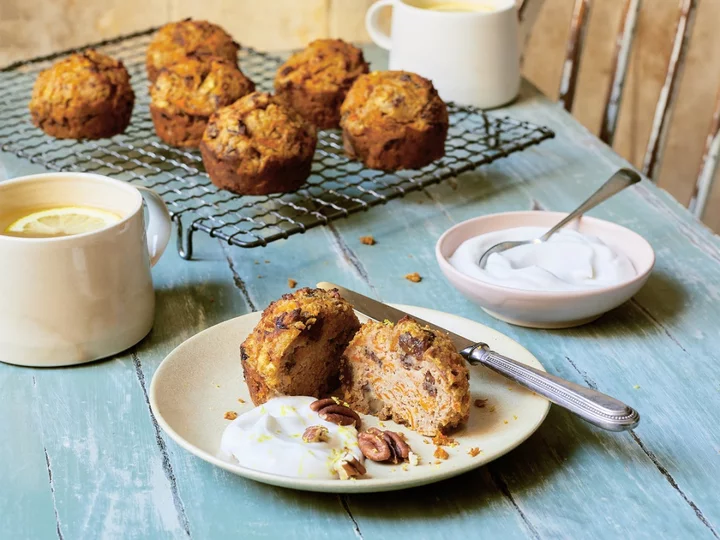
Scotland marks coronation of King Charles and Queen Camilla
By Phil Noble EDINBURGH (Reuters) -Scotland marks the coronation of King Charles and his wife Camilla on Wednesday with a
2023-07-05 21:15

More travelers get cozy with glamping, even amid high costs
More than 10.5 million North American households took a glamping trip in 2022, up from 9.6 million in 2021
2023-07-05 20:52

How to go sober if your partner still drinks
Jennifer Lopez has come under fire for launching and promoting her new alcohol brand, due to her husband Ben Affleck’s problems with alcoholism. The 53-year-old Let’s Get Loud singer, who had previously told InStyle that she abstains from caffeine and alcohol, took to Instagram following the announcement of her new liquor brand Delola, saying she enjoyed the “occasional cocktail” but did not drink to excess. Fans had been quick to criticise her, posting comments like, ‘Why not respect your husband’s sobriety?’ Her husband Ben Affleck, 50, has been candid about his struggles with alcoholism. In a 2020 New York Times interview, he shared: “It took me a long time to fundamentally, deeply, without a hint of doubt, admit to myself that I am an alcoholic… The next drink will not be different.” Affleck is sober, but seemingly, Lopez is not. “Going sober can be really difficult, especially if your partner drinks. There may be aspects of your drinking which they enjoy, so it’s quite common for people close to you, to say things which make it harder to go sober,” says Dr David McLaughlan, a visiting consultant psychiatrist for the Priory. So, how can you do it if your partner isn’t so keen? Consider what you will gain “Going sober might mean less drunken fallouts or arguments about incidents which occurred under the influence of alcohol. Avoiding hangovers also gives you back a lot more quality time together and more free cash to spend on things that matter to you,” says McLaughlan. If more sex and higher fertility are important to you, quitting the booze may help, perhaps helping to garner support from your partner too. “You might also notice increased libido and erectile function when you quit drinking. Even small amounts of alcohol reduce your fertility, so giving up will also increase your chances of falling pregnant together,” he explains. Find the right time to discuss it It may be a sensitive topic to dive into. “It is important when you go sober, that you find a time when your partner is calm, collected and willing to discuss a big change in your relationship,” says Phil Jackman, an addiction therapist at private rehab clinic Delamere. “Attempting to speak to them when they are stressed or busy may lead to unnecessary conflict. “Once you’ve found the right time, be honest with your partner and let them know the reasons you are giving up alcohol, and how this might impact your relationship. Hopefully, they will be supportive of your decision, but there might need to be a few things you need to work through first. “If you are with a partner that still likes a drink, try asking them if they can remove any alcohol from the house, or from a place you have access to it, so you aren’t tempted to give up on your sobriety,” he says. Don’t make unfair demands of them “Though it is fair to ask your partner to stop drinking and support you in sobriety, it is important that this is not a strict expectation of them. Assuming someone will automatically change their lifestyle just to suit yours may cause unnecessary conflict,” Jackman says. “Instead, when you make the decision to go sober, it’s important that you sit and talk through the reasons why you want to give up drinking, so they fully understand your decision. You may find they want to improve their own personal relationship with alcohol. However, it’s important to note, not everyone will be willing to do so. ” Seek out authenticity One of you quitting drinking could break a dangerous cycle. “If you and your partner regularly drink, more than just socialising with friends or during an occasion, your relationship could develop with a co-dependency to alcohol, where you are drinking to maintain the relationship,” says Dr Stefan Walters, Caba’s addiction specialist. “As humans, we can be highly influenced by peer pressure and the people around us. So, if we are socialising with those who drink heavily, we may feel a judgement for being sober, or that we are not joining in on the fun,” he explains. Pushing past that dependency will help you be authentic with your partner. “When you are sober, your personality is authentic, and you will feel emotionally present throughout conversations and experiences with your partner,” Walters adds. Find new things to do together If one of you does not drink, you may have to think outside the box about things you can do together. “If you are still feeling this way about the activities or hobbies after some time, I’d recommend speaking openly with your partner about adjusting or changing them,” says Walters. “Generally, you may feel that you’d rather take up healthier hobbies, like physical pursuits or mentally stimulating activities, instead of those centred around drinking, like quizzes or socialising at the pub. “So, it’s not necessarily about how to enjoy the same things, but working out how to spend time together through new activities that you both enjoy and receive emotional fulfilment from,” he explains. Going sober could help you find something new you love to do together. Read More Charity boss speaks out over ‘traumatic’ encounter with royal aide Ukraine war’s heaviest fight rages in east - follow live Fiona Phillips Alzheimer’s diagnosis at 62: 7 ways to reduce your risk 7 popular destinations that will soon be in London’s ULEZ Kate’s best Wimbledon looks, as she steps out in retro outfit for the tennis
2023-07-05 20:49

A big change is coming to Subway restaurants today
To undercut its fast-growing rivals, Subway is making a big change to its meats.
2023-07-05 20:27

IHOP® Introduces New Sweet and Savory Pancake Tacos to Menus Nationwide
PASADENA, Calif.--(BUSINESS WIRE)--Jul 5, 2023--
2023-07-05 20:21

Norse Atlantic Airways Celebrates Inaugural Flights to Los Angeles and San Francisco from London
FORT LAUDERDALE, Fla.--(BUSINESS WIRE)--Jul 5, 2023--
2023-07-05 20:20

Mars to buy healthy food maker Kevin's Natural Foods
By Anirban Sen and Abigail Summerville NEW YORK Family-owned food giant Mars Inc on Wednesday agreed to buy
2023-07-05 20:18

How to make healthy carrot and apple muffins
These muffins are naturally sweetened by the grated carrot, apple and cinnamon,” says functional nutritionist Pauline Cox. “This fibre fest will keep you feeling full and satisfied without a blood-sugar spike.” Carrot and apple muffins Makes: 12 Ingredients: 90g coconut oil, melted, plus extra for greasing 5 eggs 375g ground almonds 150g sultanas 90g walnuts or pecans, roughly chopped, plus a few extra to serve 3 tsp baking powder 3 tsp ground cinnamon 1 tsp salt 375g carrots, grated 375g apples, grated (green apples for a lower carb content) Zest and juice of 1 unwaxed lemon Coconut or natural yoghurt, to serve Method: 1. Preheat the oven to 170C fan and grease a 12-hole muffin tin. 2. In a mixing bowl, beat the eggs and combine with the melted coconut oil. 3. Add the ground almonds, sultanas, walnuts or pecans, baking powder, cinnamon and salt to the liquid egg mix, along with the grated carrots and apples and mix together to form a thick batter. Add in a quarter of the lemon juice (use the rest in drinking water) and half of the lemon zest. 4. Spoon the thick mixture into your greased muffin tray. Bake for 22-25 minutes. Remove from the oven and leave to cool. 5. Serve with a dollop of coconut or natural yoghurt, a pecan or a walnut and sprinkle with the remaining lemon zest. ‘Hungry Woman’ by Pauline Cox (Ebury Press, £27).
2023-07-05 19:22

Concerns travel rules will deter French visitors
Some are concerned changes to travel rules will make it harder for people to visit Jersey.
2023-07-05 19:20

The shared symptoms of menopause and young onset dementia
Dementia UK and The Menopause Charity have published advice on the crossover symptoms of both young onset dementia and menopause, after former TV presenter Fiona Phillips disclosed her Alzheimer’s diagnosis. The shared symptoms mean that it is difficult for some women to spot the signs of dementia and Alzheimer’s, and instead mistake those symptoms for menopause. It comes as Phillips has revealed that she has been diagnosed with Alzheimer’s, the most common type of dementia, at the age of 62. The former breakfast TV presenter first noticed symptoms of “crippling anxiety” and “brain fog”, but since Phillips had not experienced this before, she and her family thought it might be menopausal symptoms. After undergoing Hormone Therapy Treatment (HRT) to alleviate her menopausal symptoms, Phillips’s brain fog remained. This prompted Phillips and her husband to seek further help, including months of cognitive tests before a lumbar puncture to assess spinal fluid revealed she had Alzheimer’s. Dementia is an umbrella term for a range of progressive conditions that affect the brain, while Alzheimer’s is a specific disease. Paul Edwards, Director of Clinical Services at Dementia UK, said in a statement that many people are unaware of the shared symptoms of the conditions. “For some women, dementia and Alzheimer’s symptoms may develop at the same time as the perimenopause or menopause which can bring additional challenges when it comes to seeking a diagnosis,” he explained. Dementia UK and The Menopause Charity have worked together to create an information leaflet on the similarities and differences between young onset dementia and menopause and perimenopause. While dementia is most common in people over the age of 65, an estimated 70,800 people in the UK are living with young onset dementia, where symptoms begin before 65. Common menopause symptoms include changes in periods, hot flashes, fatigue, mood changes, anxiety, stress, brain fog, vaginal dryness and more. Brain fog is a very common menopause symptom, and women often say that their brains feel like “cotton wool” while experiencing it. The symptom can make it difficult to recall words, complete multiple tasks or find themselves losing things. This can affect concentration, word-finding, memory and multitasking, impacting their emotions and overall well being day to day. Since these symptoms may also occur in dementia, some women become concerned that they are showing signs of young onset dementia. According to Dementia UK, though, brain fog is not typically the first symptom of dementia, so there are other initial signs to be aware of if you are concerned about dementia or Alzheimer’s. Early signs of dementia are more likely to be changes in vision and spatial awareness, language problems and changes in behaviour. It is typical that family members, friends and work colleagues may notice these changes first, often before the person themselves. Both Dementia UK and The Menopause Charity advise that because it is difficult to know what these symptoms are being caused by, it is important to see a GP to address any concerns. For more information, you can access an information leaflet produced by both charities here. If you would like to speak to a dementia specialist Admiral Nurse about young onset dementia and perimenopause or menopause, or any other aspect of dementia, can call our free Helpline on 0800 888 6678 or by emailing helpline@dementiauk.org. Read More Fiona Phillips, 62, reveals she has Alzheimer’s disease Fiona Phillips explains why she hid Alzheimer’s diagnosis from her children Woman exits plane after tirade about passenger who is ‘not real’: ‘Final Destination vibes’ Fiona Phillips Alzheimer’s diagnosis at 62: 7 ways to reduce your risk Fiona Phillips explains why she hid Alzheimer’s diagnosis from her children Fiona Phillips, 62, reveals she has Alzheimer’s disease
2023-07-05 18:50

Some vehicle updates are better than others and experts at Edmunds fill you in on the top 5 for 2024
Automakers routinely update their vehicles with new features, engines and trim levels
2023-07-05 18:49

Fiona Phillips Alzheimer’s diagnosis at 62: 7 ways to reduce your risk
TV presenter Fiona Phillips has revealed she has been diagnosed with Alzheimer’s disease at the age of 62. The presenter and Daily Mirror columnist said the disease has “ravaged” her family and she had long feared being given the diagnosis. According to the Mirror, Phillips was diagnosed more than a year ago and is undergoing trials for a new drug that could slow the effects of the disease. Phillips, who is an Alzheimer’s Society ambassador, told the Mirror: “This disease has ravaged my family and now it has come for me. “And all over the country there are people of all different ages whose lives are being affected by it – it’s heartbreaking. “I just hope I can help find a cure which might make things better for others in the future.” As well as her column in the national newspaper, Phillips anchored GMTV for more than a decade from 1997. She also competed in the BBC’s Strictly Come Dancing in 2005. She is married to Martin Frizell, editor of ITV’s flagship programme Good Morning Britain. Phillips told the Mirror that, despite fearing she would one day be diagnosed with Alzheimer’s, the news was still a “gut-punching, shuddering shock”. The presenter said she feels “more angry than anything else” due to the disease having already affected her family life. “My poor mum was crippled with it, then my dad, my grandparents, my uncle. It just keeps coming back for us,” she said. Though she previously kept the news private, Phillips said she has decided to share her story to help end the stigma around Alzheimer’s. “There is still an issue with this disease that the public thinks of old people, bending over a stick, talking to themselves,” she said. “But I’m still here, getting out and about, meeting friends for coffee, going for dinner with Martin and walking every day.” She is taking part in clinical trials at University College Hospital in London, which aim to revolutionise future treatment. Hilary Evans, chief executive of Alzheimer’s Research UK, said: “We’re sending our love and support to Fiona and her family following her announcement that she’s living with Alzheimer’s disease. “Fiona’s been a friend of Alzheimer’s Research UK for well over a decade, and her support has shone such a valuable spotlight on the importance of research in overcoming the diseases that cause dementia. “There are around 70,800 people with dementia in the UK who, like Fiona, are under 65 and we’re determined to find a cure to end the heartbreak it causes.” It is thought at least five in every 100 people with Alzheimer’s are under 65. Though this figure may be higher, as it can be more difficult to get an accurate diagnosis at a younger age. So, is there anything you can actually do to help prevent dementia? 1. Stop drinking fizzy drinks Drinking too much coke or lemonade could increase your chances of developing dementia. People who consume the highest amounts of ultra-processed foods, like fizzy drinks and chocolate, may have a higher risk of developing dementia than those who eat the lowest amounts, a study by Huiping Li, of Tianjin Medical University in China, published in the Neurology journal, has indicated. 2. Say no to UPFs Sadly, lots of our go-to ingredients like sausages, ketchup and baked beans are highly processed, making them a risk-factor if consumed too frequently. Li, the author of the study, said: “These foods may also contain food additives, or molecules from packaging or produced during heating, all of which have been shown in other studies to have negative effects on thinking and memory skills. “Our research not only found that ultra-processed foods are associated with an increased risk of dementia, it found replacing them with healthy options may decrease dementia risk.” 3. Reduce your treats Too much chocolate and things like biscuits aren’t good for you, because they are highly processed and sugary. In fact, according to the study, for every 10% increase in daily intake of ultra-processed foods, people had a 25% higher risk of dementia. So, even just having a few extra biscuits or chocolates at work each day can heighten your risk. 4. Keep moving We all know being slumped at a desk, staring at a screen all day, isn’t great for your health, but it turns out sedentary jobs actually increase your risk of getting dementia. Dr Sara Imarisio, head of strategic initiatives at Alzheimer’s Research UK, said: “Our brains are incredibly complex, responsible for our memory, as well as what we think, feel and do. “Keeping our brains healthy as we age can help stave off diseases like Alzheimer’s, which physically attack brain cells, tearing away at the very essence of who we are. “We know that being physically and socially active can help us feel happier, healthier and more positive in general. “Lifting weights and running marathons aren’t for everyone, but there are many ways that we can stay physically active in our lives.” Noting more research published in the Neurology Journal, by Huan Song of Sichuan University in China, Imarisio continued: “This self-reported study adds to evidence that finding something you can stick to, that keeps you physically and socially active, is likely to have the greatest benefit to your health, rather than the activity itself. “The researchers found that even people with a high genetic risk for Alzheimer’s, the most common cause of dementia, could benefit from keeping physically active.” 5. Make an effort to see family and friends Social interaction is a really important way to keep your brain sharp and reduce your risk of dementia. If you avoid it, you are risking your health. According to Song’s research, people who were highly engaged in activity patterns, including frequent exercise and daily visits of family and friends, had 35% and 15% lower risk respectively, compared with people who were the least engaged. 6. Do the chores According to the same study, carrying out household chores is associated with a 21% reduced risk of dementia. Perhaps just increasing your brain activity a little, even just by washing up or changing your sheets, can help keep your mind active. 7. Play an instrument According to several studies, musicians are 64% less likely to develop mild cognitive impairment or dementia. So, if you’ve ever fancied playing the piano, guitar or ukulele, now’s the time – it’s never too late to learn something new. Read More Charity boss speaks out over ‘traumatic’ encounter with royal aide Ukraine war’s heaviest fight rages in east - follow live 7 popular destinations that will soon be in London’s ULEZ Kate’s best Wimbledon looks, as she steps out in retro outfit for the tennis How tennis could be harming your body – and why it does you good
2023-07-05 18:26
